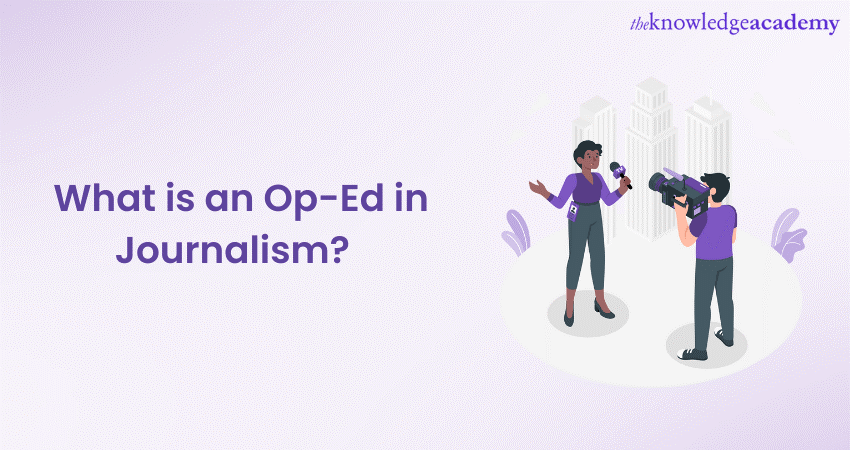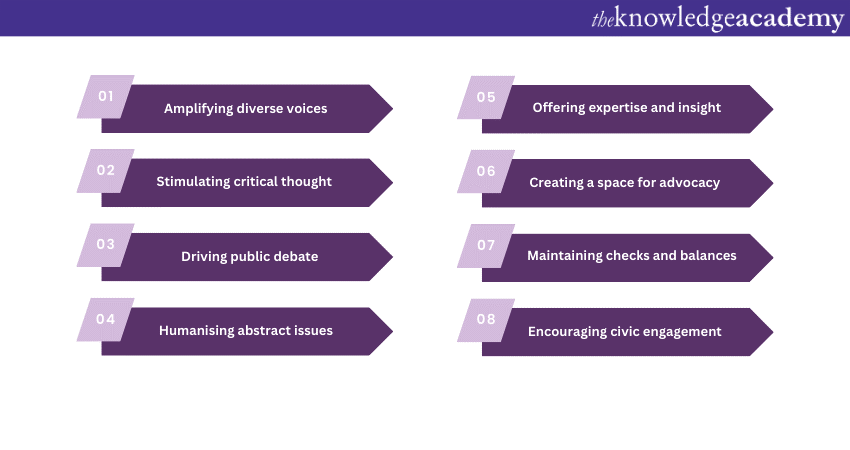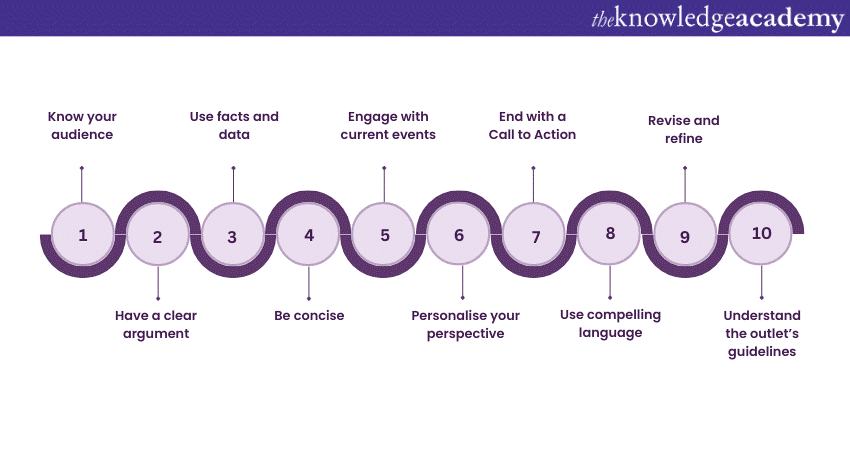We may not have the course you’re looking for. If you enquire or give us a call on 01344203999 and speak to our training experts, we may still be able to help with your training requirements.
Training Outcomes Within Your Budget!
We ensure quality, budget-alignment, and timely delivery by our expert instructors.

In the versatile domain of Journalism, the Op-Ed holds a distinct space, allowing authors to voice their perspectives on pressing issues. Navigating the art of crafting a compelling Op-Ed can be challenging. In this blog, we will tell you all you need to know about What is an Op-Ed in Journalism, why it is important, as well as tips for writing a compelling Op-Ed.
Table of Contents
1) What is an Op-Ed in Journalism?
2) The difference between Op-Eds and other articles
3) Why Op-Eds matter in Journalism?
4) Tips for writing a compelling Op-Ed
5) Conclusion
What is an Op-Ed in Journalism?
An Op-Ed, shorthand for "opposite the editorial page," is a piece of writing that expresses the personal opinions of its author, rather than objective news reporting. Typically appearing in newspapers or online publications, Op-Eds allow experts, public figures, or everyday citizens to share their personal perspectives on various topics, ranging from politics to culture.
Distinct from the editorial stance of a publication, Op-Eds contribute to the diversity of thought, fostering public discourse by introducing readers to different viewpoints on pressing issues. They play an essential role in shaping public opinion and driving conversations in society.
The difference between Op-Eds and other articles
Op-Eds and standard articles differ fundamentally in intent and content. While news articles aim to provide a balanced, factual account of events, Op-Eds are subjective, expressing the author's personal views on issues.
News pieces often adopt a neutral tone, addressing the 5 Ws (who, what, when, where, why), whereas Op-Eds delve into the "how" and "why," championing a particular perspective. This distinction is crucial in understanding the information presented: one offers an impartial recounting, and the other, a personal, often persuasive, stance.
Unlock the storyteller within you – sign up for our Get Into Journalism Training today!
Why Op-Eds matter in Journalism?
As we delve deeper into the significance of Op-Eds, it becomes clear that their importance isn't just historical or traditional—it's pivotal to sustaining a thriving, informed democracy. Here's a detailed exploration of why Op-Eds matter:

Amplifying diverse voices
At their core, Op-Eds are platforms for individuals outside of the regular editorial team to voice their perspectives. This inclusion ensures that readers get a taste of diverse opinions, not just the stance of the newspaper or magazine's editorial board.
Through Op-Eds, marginalised voices, experts in niche fields, or those affected directly by policies can offer insights that might otherwise be overlooked.
Stimulating critical thought
By presenting diverse viewpoints, Op-Eds challenge readers to think critically. Even if one doesn't agree with the Op-Ed's perspective, being exposed to varied opinions hones one’s ability to analyse, critique, and understand complex issues.
Driving public debate
Many Op-Eds address pressing societal and political issues. They can introduce new angles or insights on trending topics, propelling these conversations further and deepening the public discourse. An impactful Op-Ed can even set the tone for public debates, influencing policymakers, activists, and the general public.
Humanising abstract issues
Op-Eds often merge the personal with the political. By weaving in personal narratives or experiences, Op-Ed writers can humanise abstract or complex issues, making them more relatable to readers. This personal touch can make distant topics feel more immediate and urgent.
Offering expertise and insight
Professionals, researchers, and experts often write Op-Eds to provide context and depth to issues in their area of expertise. This input can be invaluable in helping the general public understand intricate or nuanced topics.
Creating a space for advocacy
Op-Eds can serve as tools for advocacy. Activists, community leaders, and concerned citizens can use this platform to champion causes, push for reforms, or highlight injustices.
Maintaining checks and balances
As venues for public opinion and critique, Op-Eds can serve as a counterweight to potential biases in media reporting or editorial stances. They offer a space where policies, decisions, and actions of leaders can be analysed, supported, or critiqued.
Encouraging civic engagement
By informing readers about issues from diverse perspectives, Op-Eds can inspire them to take action, whether it's voting, attending community meetings, or participating in protests and movements.
Unlock your literary potential with our Creative Writing Training – sign up now!
Tips for writing a compelling Op-Ed

1) Know your audience: Research your target publication. Understand readers' interests. Adjust tone and content to best resonate with the demographic you're addressing.
2) Have a clear argument: Begin with a precise thesis. Ensure readers grasp your stance early on. Keep the focus consistent, avoiding tangential deviations.
3) Use facts and data: Back your points with credible evidence. Use statistics judiciously, enhancing your narrative without overwhelming. Reliability boosts your Op-Ed's persuasive power.
4) Be concise: Clarity is crucial. Eliminate redundancies, ensuring each word adds value. A logically structured flow ensures better reader engagement and understanding.
5) Engage with current events: Address topical issues, making your piece timely. Offer fresh angles, ensuring your perspective adds value to ongoing conversations.
6) Personalise your perspective: Infuse personal narratives to humanise broad issues. These stories evoke empathy, making abstract points more tangible and relatable.
7) End with a Call to Action: Inspire readers to act post-reading. Offer clear directives, suggesting how they can make a difference or further engage.
8) Use compelling language: Employ evocative imagery and dynamic phrasing. Avoid technical jargon, ensuring broad accessibility and engagement.
9) Revise and refine: Feedback is invaluable. Have trusted individuals review your piece. Edit rigorously, ensuring clarity, coherence, and accuracy.
10) Understand the outlet’s guidelines: Adhere to specific submission criteria. Respect word limits and format preferences. Each publication's requirements are unique, so tailor accordingly.

Conclusion
To sum it up, crafting a compelling Op-Ed requires a blend of passion, precision, and awareness of the intended audience. By adhering to the aforementioned guidelines, writers can effectively convey their perspectives, fostering informed discourse and inspiring readers to engage more deeply with pertinent issues. Hope we could answer all your queries about “What is an Op-Ed in Journalism”!
Unlock your untapped potential today with our Personal Development Training!
Frequently Asked Questions
Upcoming Business Skills Resources Batches & Dates
Date
 Time Management Training
Time Management Training
Fri 27th Dec 2024
Fri 10th Jan 2025
Fri 14th Mar 2025
Fri 9th May 2025
Fri 11th Jul 2025
Fri 12th Sep 2025
Fri 14th Nov 2025







 Top Rated Course
Top Rated Course


 If you wish to make any changes to your course, please
If you wish to make any changes to your course, please


